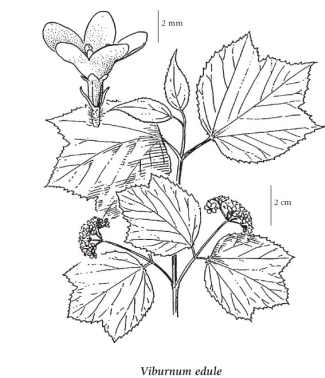Viburnum edule (Michx.) Raf.
highbush-cranberry (mooseberry; squashberry)
Adoxaceae (Honeysuckle family)
(Previously in Caprifoliaceae)
Introduction to Vascular Plants
highbush-cranberry (mooseberry; squashberry)
Adoxaceae (Honeysuckle family)
(Previously in Caprifoliaceae)
Introduction to Vascular Plants
Species Information
General:
Deciduous, sprawling to erect shrub, spreading from rhizomes and by layering, 0.5-3.5 m tall; twigs glabrous; bark smooth, reddish to grey.
Leaves:
Opposite, stalked, elliptic in outline, most shallowly 3-lobed but some unlobed, jaggedly toothed, often with an isolated pair of glandular teeth near the junction of the blade and stalk, glabrous or hairy beneath, especially along the veins, turning crimson in the fall.
Flowers:
Inflorescence a small, compact, flat or rounded cluster of few to several flowers, 1-3 cm across, borne on short axillary stalks with a pair of leaves; flowers all alike and fertile; petals whitish, fused at bases into tubes that flare (4-7 mm wide) at the tops to 5 lobes; stamens inconspicuous, the filaments 1 mm long or less.
Fruits:
Berrylike drupes, clustered, red or orange, 0.8-1.5 cm long, each with a single, large, flattened stone.
Illustration

If more than one illustration is available for a species (e.g., separate illustrations were provided for two subspecies) then links to the separate images will be provided below. Note that individual subspecies or varietal illustrations are not always available.
Illustration Source: The Illustrated Flora of British Columbia
USDA Species Characteristics
Flower Colour:
White
Blooming Period:
Late Spring
Fruit/Seed characteristics:
Colour: Red
Present from Summer to Fall
Source: The USDA
Ecology
Ecological Framework for Viburnum edule
The table below shows the species-specific information calculated from
original data (BEC database) provided by the BC Ministry of Forests and Range.
(Updated August, 2013)
The table below shows the species-specific information calculated from
original data (BEC database) provided by the BC Ministry of Forests and Range.
(Updated August, 2013)
| Site Information |
Value / Class |
||
|
Avg |
Min |
Max |
|
| Elevation
(metres) |
841 | 0 | 2500 |
| Slope
Gradient (%) |
13 | -2 | 262 |
|
Aspect (degrees) |
343 | 0 | 360 |
| Soil
Moisture Regime (SMR) [0 - very xeric; 4 - mesic; 8 - hydric] |
4 | 0 | 8 |
| Modal
Nutrient Regime
Class |
C | ||
| #
of field plots species was recorded in: |
6420 | ||
| Modal
BEC Zone Class |
SBS | ||
|
All BEC Zones (# of stations/zone) species was recorded in |
BWBS(1246), CWH(284), ESSF(330), ICH(1007), IDF(205), MH(5), MS(347), PP(4), SBPS(111), SBS(2433), SWB(43) | ||
|
Source:
Klinkenberg 2013
|
|||
Habitat and Range
Wet to moist streambanks, swamps and forests in the lowland, steppe and montane zones; frequent throughout BC; N to AK, YT and NT, E to NF, and S to PA, ID, CO and OR.Status Information
Synonyms
Synonyms and Alternate Names:
Viburnum pauciflorum La Pylaie ex Torr. & A. Gray